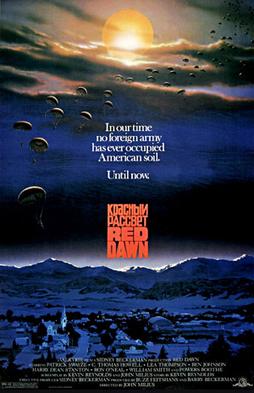
Red Dawn is a 1984 American action drama film directed by John Milius with a screenplay by Milius and Kevin Reynolds. The film depicts a fictional World War III centering on a land invasion of the continental United States by an alliance of Soviet, Warsaw Pact and Latin American states. The story follows a group of teenaged guerillas, known as the Wolverines, in Soviet-occupied Colorado. The film stars Patrick Swayze, Charlie Sheen, C. Thomas Howell, Lea Thompson and Jennifer Grey, with supporting roles played by Ben Johnson, Harry Dean Stanton, Ron O'Neal, William Smith and Powers Boothe.

Europa Europa is a 1990 historical war drama film directed by Agnieszka Holland, and starring Marco Hofschneider, Julie Delpy, Hanns Zischler, and André Wilms. It is based on the 1989 autobiography of Solomon Perel, a German-Jewish boy who escaped the Holocaust by masquerading as a Nazi and joining the Hitler Youth. Perel himself appears briefly as "himself" in the film's finale. The film's title refers to World War II's division of continental Europe, resulting in a constant national shift of allegiances, identities, and front lines.

Ivan's Childhood, sometimes released as My Name Is Ivan in the US, is a 1962 Soviet war drama film directed by Andrei Tarkovsky. Co-written by Mikhail Papava, Andrei Konchalovsky and an uncredited Tarkovsky, it is based on Vladimir Bogomolov's 1957 short story "Ivan". The film features child actor Nikolai Burlyayev along with Valentin Zubkov, Evgeny Zharikov, Stepan Krylov, Nikolai Grinko, and Tarkovsky's wife Irma Raush.
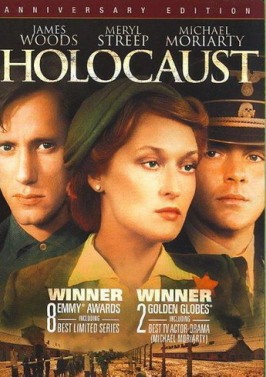
Holocaust (1978) is an American television miniseries which aired on NBC over four nights, from April 16 - April 19, 1978.

The Vilna Ghetto was a World War II Jewish ghetto established and operated by Nazi Germany in the city of Vilnius in the modern country of Lithuania, at the time part of the Nazi-administered Reichskommissariat Ostland.

Come and See is a 1985 Soviet anti-war film directed by Elem Klimov and starring Aleksei Kravchenko and Olga Mironova. Its screenplay, written by Klimov and Ales Adamovich, is based on the 1971 novel "Khatyn" and the 1977 memoir I Am from the Fiery Village, of which Adamovich was a co-author. Klimov had to fight eight years of censorship from the Soviet authorities before he could be allowed to produce the film in its entirety.

Jewish partisans were fighters in irregular military groups participating in the Jewish resistance movement against Nazi Germany and its collaborators during World War II.

Days of Glory is a 1944 American film, directed by Jacques Tourneur, which tells the story of a group of Soviet guerrillas fighting back during the 1941 Nazi invasion of Russia. It marked the film debut of Tamara Toumanova and Gregory Peck, as well as most of the other principal actors. It was also the first film produced by screen writer Casey Robinson, who in early January 1943 had been contracted by RKO Radio Pictures to write and produce the film under the working title This Is Russia. Robinson and Toumanova married in 1944 and divorced in 1955. The film included the last screen appearance of actor Erford Gage, who subsequently entered the U.S. Army and was killed in action in 1945.

The Dawns Here Are Quiet is a 1972 Soviet war drama directed by Stanislav Rostotsky based on Boris Vasilyev's novel of the same name. The film deals with antiwar themes and focuses on a garrison of Russian female soldiers in World War II. It was nominated for an Oscar in the Best Foreign Language Film category. The film is set in Karelia and was filmed near Ruskeala.

Kapò is a 1960 historical war drama film directed and co-written by Gillo Pontecorvo. It was one of the first narrative films to deal explicitly with the subject of the Holocaust, with graphic depictions of concentration camps which made it controversial at the time. A co-production of Italian, French, and Yugoslavian companies, the film stars American actress Susan Strasberg, along with Laurent Terzieff, Emmanuelle Riva, Didi Perego and Gianni Garko. The title refers to a prisoner functionary in the Nazi concentration camps.
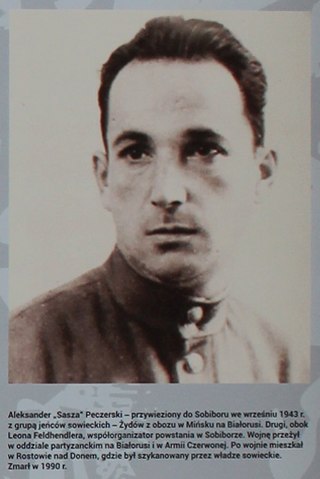
Alexander 'Sasha' Pechersky was one of the organizers, and the leader, of the most successful uprising and mass-escape of Jews from a Nazi extermination camp during World War II, which occurred at the Sobibor extermination camp on 14 October 1943.
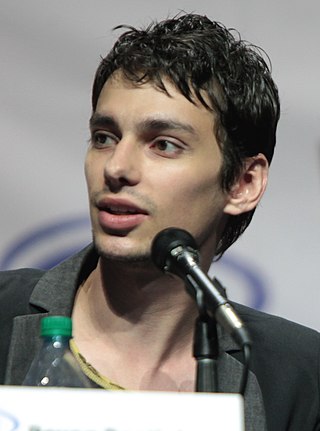
Devon Bostick is a Canadian actor. He played Rodrick Heffley in the first three Diary of a Wimpy Kid films, starred in the Atom Egoyan-directed film Adoration (2008) and portrayed Jasper Jordan on the dystopian science fiction television series The 100 from 2014 to 2017.
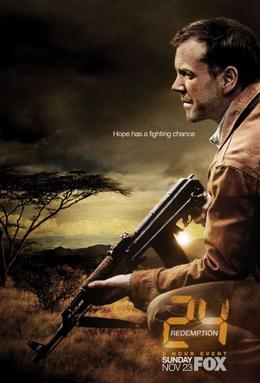
24: Redemption is a television film based on the series 24. Redemption takes place almost four years after the sixth season and two months before the seventh season in real time between 3:00 pm and 5:00 pm on Inauguration Day in the United States. The main setting is Sangala, a fictional African country, where ex-Counter Terrorist Unit Agent Jack Bauer tries to find peace with himself, and works as a missionary with Carl Benton, who built the Okavango school to aid war orphans. Bauer is served a subpoena to appear before the United States Senate regarding human rights violations, but refuses to go, and a shadow organization among the United States government aids General Benjamin Juma and his militia in a coup d'état. Juma's militia attempts to kidnap the children from the school and Jack has to decide whether or not to give himself up to American authorities in order to keep the children safe.
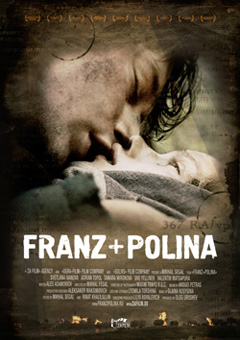
Franz + Polina is a 2006 Russian war romance film set in 1943 in occupied Belarus. It tells the story of Franz, a Waffen-SS soldier who deserts, and Polina, a Belarusian woman whose village is razed and people massacred.
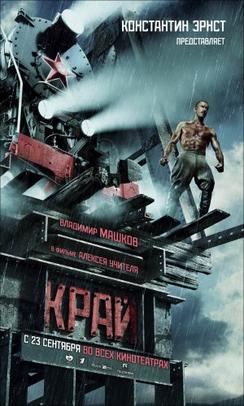
The Edge is a 2010 Russian historical drama film directed by Alexei Uchitel. The film was nominated for the 2010 Golden Globe Award for Best Foreign Language Film and was also selected as the Russian entry for the Best Foreign Language Film at the 83rd Academy Awards but it didn't make the final shortlist.

A Soldier's Prayer is a 1961 Japanese film directed by Masaki Kobayashi. It is the third part of The Human Condition trilogy.

Laufey is a supervillain appearing in American comic books published by Marvel Comics. The character is depicted usually as an enemy of the Asgardian king Odin, father of Thor. He is the King of the Frost Giants, the biological father of Thor's adopted brother and archenemy, Loki. Created by writer Stan Lee and artist Jack Kirby, he first appeared in Journey into Mystery #112, and was based on the goddess of the same name who in Norse mythology was actually the mother of Loki.

The Case of Sergeant Grischa is a 1930 American pre-Code drama film directed by Herbert Brenon, based on the German novel of the same name by Arnold Zweig. John Tribby was nominated for an Academy Award for Best Sound Recording. No known copy of this film exists and is considered lost, the only sound film to have been nominated for an Oscar and subsequently suffered this fate.

Lore is a 2012 German-language historical drama film directed by Cate Shortland. It is based on the 2001 novel The Dark Room by Rachel Seiffert. In south-west Germany, during the aftermath of World War II, five destitute siblings must travel 900 km (560 mi) to their grandmother's home by the Bay of Husum near Hamburg after their high-level Nazi parents disappear in danger of arrest by Allied occupation authorities. Along the way, they encounter a variety of other Germans, some of whom are helpful while others are antagonistic. Eventually they meet up with a young man presenting himself as Thomas, a young Jewish concentration camp survivor, who joins their group and becomes their unofficial guardian.

Generation War is a German World War II TV miniseries in three parts. It was commissioned by the public broadcasting organization ZDF, produced by the UFA subsidiary TeamWorx, and first aired in Germany and Austria in March 2013. The series tells the story of five German friends, aged around 20, on different paths through Nazi Germany and World War II: as Wehrmacht soldiers on the Eastern Front, a war nurse, an aspiring singer, and a Jewish tailor. The narrative spans four years, starting in 1941 Berlin, when the friends meet up for a last time before embarking on their journeys, enthusiastically vowing to meet up again the following Christmas. The story's conclusion is set shortly after the end of the war in 1945.




















